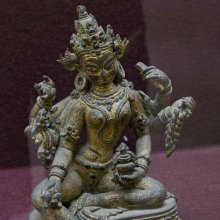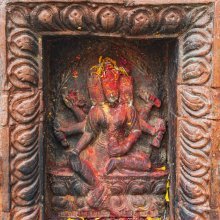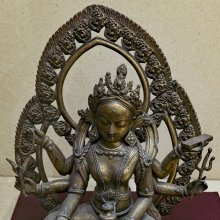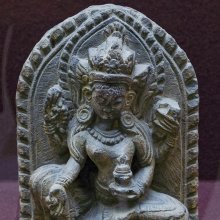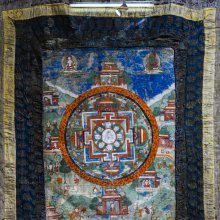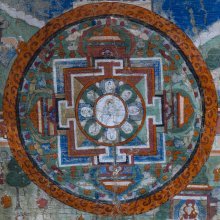Vasundhara, Vasundharā, Vasuṃdharā, Vasumdhara, Vasumdhara: 26 definitions
Introduction:
Vasundhara means something in Buddhism, Pali, Hinduism, Sanskrit, Jainism, Prakrit, the history of ancient India, Marathi, Hindi. If you want to know the exact meaning, history, etymology or English translation of this term then check out the descriptions on this page. Add your comment or reference to a book if you want to contribute to this summary article.
Images (photo gallery)
(+4 more images available)
In Hinduism
Vaishnavism (Vaishava dharma)
Source: ISKCON Press: GlossaryVasundharā (वसुन्धरा).—A name for mother earth meaning “she who has very fertile soil and unlimited wealth”.

Vaishnava (वैष्णव, vaiṣṇava) or vaishnavism (vaiṣṇavism) represents a tradition of Hinduism worshipping Vishnu as the supreme Lord. Similar to the Shaktism and Shaivism traditions, Vaishnavism also developed as an individual movement, famous for its exposition of the dashavatara (‘ten avatars of Vishnu’).
Purana and Itihasa (epic history)
Source: archive.org: Shiva Purana - English TranslationVasundharā (वसुन्धरा) refers to one of the sixteen celestial ladies (Divyanārī), according to the Śivapurāṇa 2.3.50 (“Description of fun and frolic”).—Accordingly, as Brahmā narrated to Nārada: “[...] Then the sixteen celestial ladies arrived there and saw the couple [i.e., Śiva and Pārvatī] with great respect. They were Sarasvatī, Lakṣmī, Sāvitrī, Jāhnavī, Aditi, Śacī, Lopāmudrā, Arundhatī, Ahalyā, Tulasī, Svāhā, Rohiṇī, Vasundharā, Śatarūpā, Saṃjñā and Rati. There were several virgins of the gods, Nāgas, and the sages. They were charming and attractive. Who can enumerate them? [...]”.
Source: Cologne Digital Sanskrit Dictionaries: The Purana Index1) Vasundharā (वसुन्धरा).—From which the whole world springs and ends.*
- * Vāyu-purāṇa 62. 193.
2) Vasundhara (वसुन्धर).—A class of people in Śālmalidvīpa.*
- * Bhāgavata-purāṇa V. 20. 11.

The Purana (पुराण, purāṇas) refers to Sanskrit literature preserving ancient India’s vast cultural history, including historical legends, religious ceremonies, various arts and sciences. The eighteen mahapuranas total over 400,000 shlokas (metrical couplets) and date to at least several centuries BCE.
Ayurveda (science of life)
Nighantu (Synonyms and Characteristics of Drugs and technical terms)
Source: Wisdom Library: Raj NighantuVasundharā (वसुन्धरा) refers to “earth” and is mentioned in a list of 53 synonyms for dharaṇi (“earth”), according to the second chapter (dharaṇyādi-varga) of the 13th-century Raj Nighantu or Rājanighaṇṭu (an Ayurvedic encyclopedia). The Dharaṇyādi-varga covers the lands, soil [viz., Vasundharā], mountains, jungles and vegetation’s relations between trees and plants and substances, with their various kinds.

Āyurveda (आयुर्वेद, ayurveda) is a branch of Indian science dealing with medicine, herbalism, taxology, anatomy, surgery, alchemy and related topics. Traditional practice of Āyurveda in ancient India dates back to at least the first millenium BC. Literature is commonly written in Sanskrit using various poetic metres.
Shaktism (Shakta philosophy)
Source: Brill: Śaivism and the Tantric Traditions (shaktism)Vasundhara (वसुन्धर) refers to “rich lands”, according to the King Vatsarāja’s Pūjāstuti called the Kāmasiddhistuti (also Vāmakeśvarīstuti), guiding one through the worship of the Goddess Nityā.—Accordingly, “[...] O mother! Even the kings of gods bow to the feet of those men who have acquired a drop of the grace of seeing you. Kings of all the rich lands (vasundhara-indra) extending to the four oceans [bow to them] all the more, illuminating their footrests with the studded jewels of their elevated crowns”.

Shakta (शाक्त, śākta) or Shaktism (śāktism) represents a tradition of Hinduism where the Goddess (Devi) is revered and worshipped. Shakta literature includes a range of scriptures, including various Agamas and Tantras, although its roots may be traced back to the Vedas.
Ganitashastra (Mathematics and Algebra)
Source: archive.org: Hindu MathematicsVasundharā (वसुन्धरा) represents the number 1 (one) in the “word-numeral system” (bhūtasaṃkhyā), which was used in Sanskrit texts dealing with astronomy, mathematics, metrics, as well as in the dates of inscriptions and manuscripts in ancient Indian literature.—A system of expressing numbers by means of words arranged as in the place-value notation was developed and perfected in India in the early centuries of the Christian era. In this system the numerals [e.g., 1—vasundharā] are expressed by names of things, beings or concepts, which, naturally or in accordance with the teaching of the Śāstras, connote numbers.

Ganitashastra (शिल्पशास्त्र, gaṇitaśāstra) refers to the ancient Indian science of mathematics, algebra, number theory, arithmetic, etc. Closely allied with astronomy, both were commonly taught and studied in universities, even since the 1st millennium BCE. Ganita-shastra also includes ritualistic math-books such as the Shulba-sutras.
In Buddhism
Mahayana (major branch of Buddhism)
Source: Wisdom Library: LokottaravādaVasundhara (वसुन्धर) is the name of a Buddha under whom Śākyamuni (or Gautama, ‘the historical Buddha’) acquired merit along the first through nine bhūmis, according to the Mahāvastu. There are in total ten bhūmis representing the ten stages of the Bodhisattva’s path towards enlightenment. His name can also be spelled as Vasuṃdhara (वसुंधर).
Vasundhara is but one among the 500 Buddhas enumerated in the Mahāvastu during a conversation between Mahākātyāyana and Mahākāśyapa, both principle disciples of Gautama Buddha. The Mahāvastu is an important text of the Lokottaravāda school of buddhism, dating from the 2nd century BCE.

Mahayana (महायान, mahāyāna) is a major branch of Buddhism focusing on the path of a Bodhisattva (spiritual aspirants/ enlightened beings). Extant literature is vast and primarely composed in the Sanskrit language. There are many sūtras of which some of the earliest are the various Prajñāpāramitā sūtras.
In Jainism
General definition (in Jainism)
Source: archive.org: Trisastisalakapurusacaritra1a) Vasundharā (वसुन्धरा) refers to one of the eight Dikkumārīs living on the southern Rucaka mountains (in the Rucakadvīpa continent), according to chapter 1.2 [ādīśvara-caritra] of Hemacandra’s 11th century Triṣaṣṭiśalākāpuruṣacaritra: an ancient Sanskrit epic poem narrating the history and legends of sixty-three illustrious persons in Jainism.
Accordingly, “[...] Eight Dikkumārīs [viz., Vasundharā], living on the southern Rucaka Mountains, came there, impelled by joy like a whip. Having bowed to the Ford of Jinas and his mother and having introduced themselves as before, they stood on the right, singing, with pitchers in their hands. [...].”.
1b) Vasundharā (वसुन्धरा) refers to one of the 32 mountains between the lotus-lakes situated near the four Añjana mountains, which are situated in the “middle world” (madhyaloka), according to chapter 2.3.—Accordingly, “In the four directions from each of the Añjana Mountains there are lotus-lakes, 100,000 yojanas square: [...]. Between each two lotus-lakes there are 2 Ratikara Mountains so there are 32 Ratikara Mountains (e.g., Vasundharā). [...] In them (i.e., the 32 Ratikara Mountains, e.g., Vasundharā) the gods with all their splendor together with their retinues make eight-day festivals in the shrines on the holy days of the holy Arhats”.
1c) Vasundharā (वसुन्धरा) refers to one of the two wifes of king Stimitasāgara from Śubhā, according to chapter 5.2 [śāntinātha-caritra].—Accordingly:—“Now, in this Jambūdvīpa in the province Ramaṇīya, the ornament of East Videha, on the south bank of the Śītā, there is a city, named Śubhā, [...]. Its king was Stimitasāgara, who surpassed Meru in firmness, the ocean in depth. He had two wives, Vasundharā and Anuddharā, who wore the yoke of good conduct, by whom the wealth of beauty of an Apsaras was surpassed. The soul of Amitatejas fell from Nanditāvarta and descended into the womb of Queen Śrīmat Vasundharā. [...]”.
2a) Vasundhara (वसुन्धर) is the name of an ancient king from Susīmā, according to chapter 6.5 [datta-nandana-prahlāda-caritra].—Accordingly:—“There is a city Susīmā, the ornament of East Videha of this Jambūdvīpa and there was a king there, Vasundhara. After he had guarded the earth for a long time, he took the vow under Muni Sudharma, and went to Brahmaloka after death”.

Jainism is an Indian religion of Dharma whose doctrine revolves around harmlessness (ahimsa) towards every living being. The two major branches (Digambara and Svetambara) of Jainism stimulate self-control (or, shramana, ‘self-reliance’) and spiritual development through a path of peace for the soul to progess to the ultimate goal.
India history and geography
Source: What is India: Epigraphia Indica volume XXXI (1955-56)Vasundhara is one of the Brāhmaṇa donees mentioned in the “Asankhali plates of Narasiṃha II” (1302 A.D.). When a grant was made to a large number of Brāhmaṇas, the chief amongst the donees seems to have been called Pānīyagrāhin especially. In the present record, though all the donees (e.g., Vasundhara) are referred to as Pāṇigrāhi-mahājana, their list is headed by a Brāhmaṇa with Pāṇigrahī as his surname.
These copper plates (mentioning Vasundhara) were discovered from the house of a Santal inhabitant of Pargana Asankhali in the Mayurbhanj State (Orissa). It was made when king Vīra-Narasiṃhadeva was staying at the Bhairavapura-kaṭaka (city, camp or residence).
Source: Cologne Digital Sanskrit Dictionaries: Indian Epigraphical GlossaryVasundharā.—(IE 7-1-2), ‘one’. Note: vasundharā is defined in the “Indian epigraphical glossary” as it can be found on ancient inscriptions commonly written in Sanskrit, Prakrit or Dravidian languages.

The history of India traces the identification of countries, villages, towns and other regions of India, as well as mythology, zoology, royal dynasties, rulers, tribes, local festivities and traditions and regional languages. Ancient India enjoyed religious freedom and encourages the path of Dharma, a concept common to Buddhism, Hinduism, and Jainism.
Languages of India and abroad
Pali-English dictionary
Source: BuddhaSasana: Concise Pali-English Dictionaryvasundharā : (f.) the earth.

Pali is the language of the Tipiṭaka, which is the sacred canon of Theravāda Buddhism and contains much of the Buddha’s speech. Closeley related to Sanskrit, both languages are used interchangeably between religions.
Marathi-English dictionary
Source: DDSA: The Molesworth Marathi and English Dictionaryvasundharā (वसुंधरा).—f S vasudhā f S vasumatī f S (That has or contains wealth.) Descriptive names for the earth.
Source: DDSA: The Aryabhusan school dictionary, Marathi-Englishvasundharā (वसुंधरा).—f The earth.
Marathi is an Indo-European language having over 70 million native speakers people in (predominantly) Maharashtra India. Marathi, like many other Indo-Aryan languages, evolved from early forms of Prakrit, which itself is a subset of Sanskrit, one of the most ancient languages of the world.
Sanskrit dictionary
Source: DDSA: The practical Sanskrit-English dictionaryVasuṃdharā (वसुंधरा).—The earth; नानारत्ना वसुंधरा (nānāratnā vasuṃdharā); R.4.7; वसुंधरा काल इवोप्तबीजा (vasuṃdharā kāla ivoptabījā) Ś.6.24.
Source: Cologne Digital Sanskrit Dictionaries: Edgerton Buddhist Hybrid Sanskrit DictionaryVasuṃdhara (वसुंधर).—(1) name of a śreṣṭhin, previous incar-nation of the Bodhisattva: Mahāvastu i.93.11; (2) name of a former Buddha: Mahāvastu i.136.14.
--- OR ---
Vasuṃdharā (वसुंधरा).—(1) name of a goddess (not the same as Vasudhārā, apparently): Sādhanamālā 421.12; (2) name of a rākṣasī: Mahā-Māyūrī 243.24.
Source: Cologne Digital Sanskrit Dictionaries: Shabda-Sagara Sanskrit-English DictionaryVasundharā (वसुन्धरा).—f.
(-rā) The earth. E. vasu wealth, dhṛ to have, khac aff.
Source: Cologne Digital Sanskrit Dictionaries: Benfey Sanskrit-English DictionaryVasuṃdharā (वसुंधरा).—i. e. vasu + m -dhṛ + a, f. The earth, [Pañcatantra] 101, 23.
Source: Cologne Digital Sanskrit Dictionaries: Cappeller Sanskrit-English DictionaryVasuṃdhara (वसुंधर).—[adjective] containing wealth. [feminine] ā the earth, land.
Source: Cologne Digital Sanskrit Dictionaries: Aufrecht Catalogus CatalogorumVasuṃdhara (वसुंधर) as mentioned in Aufrecht’s Catalogus Catalogorum:—poet. Śp. p. 83. [Sūktikarṇāmṛta by Śrīdharadāsa]
Source: Cologne Digital Sanskrit Dictionaries: Monier-Williams Sanskrit-English Dictionary1) Vasuṃdhara (वसुंधर):—[=vasu-ṃ-dhara] [from vasu > vas] mfn. containing w°, [Harivaṃśa]
2) [v.s. ...] m. Name of a poet, [Śārṅgadhara-paddhati; Sadukti-karṇāmṛta] etc.
3) [v.s. ...] of another man, [Kathāsaritsāgara]
4) [v.s. ...] [plural] Name of the Vaiśyas in Śālmaladvīpa, [Bhāgavata-purāṇa]
5) [v.s. ...] of a people, [Monier-Williams’ Sanskrit-English Dictionary]
6) Vasuṃdharā (वसुंधरा):—[=vasu-ṃ-dharā] [from vasuṃ-dhara > vasu > vas] a f. See below
7) [=vasu-ṃ-dharā] [from vasu > vas] b f. the earth
8) [v.s. ...] a country, kingdom, [Nṛsiṃha-tāpanīya-upaniṣad; Mahābhārata; Kāvya literature] etc.
9) [v.s. ...] the soil, the ground (also rā-pṛṣṭha n.), [Mahābhārata; Rāmāyaṇa] etc.
10) [v.s. ...] Name of a minute portion of Prakṛti, [Catalogue(s)]
11) [v.s. ...] (with Buddhists) Name of a goddess, [Horace H. Wilson]
12) [v.s. ...] of a daughter of Śva-phalka, [Harivaṃśa]
13) [v.s. ...] of a princess, [Daśakumāra-carita]
14) [v.s. ...] of another woman, [Ratnāvalī]
15) [v.s. ...] [dual number] Name of the two Kumārīs (set up with Indra’s banner See kumāri), [Varāha-mihira’s Bṛhat-saṃhitā]
Source: Cologne Digital Sanskrit Dictionaries: Yates Sanskrit-English DictionaryVasundharā (वसुन्धरा):—[vasu-ndharā] (rā) 1. f. The earth.
Source: DDSA: Paia-sadda-mahannavo; a comprehensive Prakrit Hindi dictionary (S)Vasundhara (वसुन्धर) in the Sanskrit language is related to the Prakrit words: Vasuṃdhara, Vasuṃdharā.
[Sanskrit to German]
Sanskrit, also spelled संस्कृतम् (saṃskṛtam), is an ancient language of India commonly seen as the grandmother of the Indo-European language family (even English!). Closely allied with Prakrit and Pali, Sanskrit is more exhaustive in both grammar and terms and has the most extensive collection of literature in the world, greatly surpassing its sister-languages Greek and Latin.
Hindi dictionary
Source: DDSA: A practical Hindi-English dictionaryVasuṃdharā (वसुंधरा) [Also spelled vasundhara]:—(nf) the earth.
Source: DDSA: A practical Hindi-English dictionaryVasundhara in Hindi refers in English to:—(nf) the earth..—vasundhara (वसुंधरा) is alternatively transliterated as Vasuṃdharā.
...
Prakrit-English dictionary
Source: DDSA: Paia-sadda-mahannavo; a comprehensive Prakrit Hindi dictionary1) Vasuṃdhara (वसुंधर) in the Prakrit language is related to the Sanskrit word: Vasundhara.
2) Vasuṃdharā (वसुंधरा) also relates to the Sanskrit word: Vasundharā.
Prakrit is an ancient language closely associated with both Pali and Sanskrit. Jain literature is often composed in this language or sub-dialects, such as the Agamas and their commentaries which are written in Ardhamagadhi and Maharashtri Prakrit. The earliest extant texts can be dated to as early as the 4th century BCE although core portions might be older.
See also (Relevant definitions)
Partial matches: Vasum, Dhara.
Starts with: Vasundharamahavidya, Vasundharendra.
Ends with: Bahuraratnavasundhara, Nanaratnavasundhara, Shrivasundhara.
Full-text (+59): Vacuntarai, Kavirajavasumdhara, Vasumdhareya, Vasumdharaprishtha, Vasumdharashunasira, Vasumdharadhara, Vasumdharadhava, Agamya, Vasumdharabhrit, Vasumdharesha, Varadhara, Kaviraja, Saptadvipa, Shunashira, Nishkaurava, Aparyaptavat, Vasu, Uta, Andolanem, Vasudha.
Relevant text
Search found 31 books and stories containing Vasundhara, Vasum-dhara, Vasuṃ-dhara, Vasuṃ-dharā, Vasuṃdhara, Vasuṃdharā, Vasuṃdhara, Vasumdhara, Vasumdhara, Vasuṃdharā, Vasun-dhara, Vasun-dharā, Vasundharā; (plurals include: Vasundharas, dharas, dharās, Vasuṃdharas, Vasuṃdharās, Vasumdharas, Vasundharās). You can also click to the full overview containing English textual excerpts. Below are direct links for the most relevant articles:
Trishashti Shalaka Purusha Caritra (by Helen M. Johnson)
Part 1: Birth of Aparājita < [Chapter II - Sixth incarnation as Aparājita]
Part 2: First incarnation as Dhana < [Chapter I - Previous incarnations of Ariṣṭanemi (Nemi)]
Part 2: Previous births of Nandana < [Chapter V - Dattanandanaprahlādacaritra]
Garga Samhita (English) (by Danavir Goswami)
Verse 1.3.37 < [Chapter 3 - Description of the Lord’s Appearance]
Verse 4.8.37 < [Chapter 8 - In the Story of the Yajña-sītās, the Glories of Ekādaśī]
The Markandeya Purana (by Frederick Eden Pargiter)
Vastu-shastra (5): Temple Architecture (by D. N. Shukla)
Sanskrit sources of Kerala history (by Suma Parappattoli)
6. Samudrabandha’s commentary on the Alankarasarvasva < [Chapter 6 - Miscellaneous Sanskrit works bearing on Kerala history]
Chaitanya Bhagavata (by Bhumipati Dāsa)
Verse 2.8.190 < [Chapter 8 - The Manifestation of Opulences]
Verse 1.2.49 < [Chapter 2 - The Lord’s Appearance]
